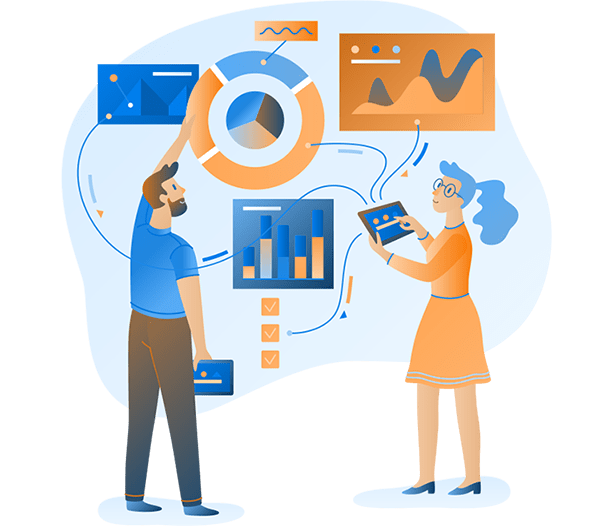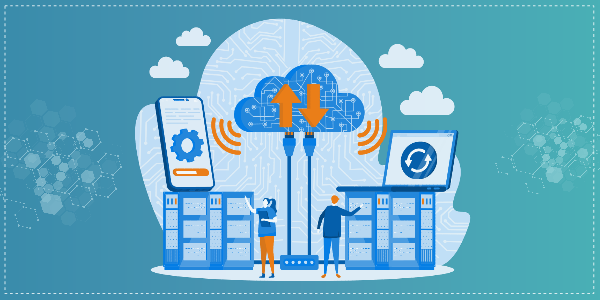
In the Journey of Digital Transformation Where Should Organizations Start to Achieve Data-driven Insights and Improved Operational Efficiencies?
Technology fosters innovation resulting in the emergence of newer series of phenomena. And one such remarkable example is - Digital transformation.
What is Digital Transformation?
Digital transformation essentially refers to the adoption of digital technologies by organizations towards improving - business process efficiency, customer experience, supply chain visibility and predictability, optimization of network operations, and culture. In a nutshell, it defines a novel way of reimagining business and achieving value-addition.
Often, the four pillars - Social, Mobile, Analytics, and Cloud, abbreviated as SMAC, which drives business innovation, are regarded as the cornerstone for digital transformation. As a first step, organizations embarked on their digital transformation journey by adopting one or more of these digital tools. As digital technologies, synonymous with SMAC, began reshaping industries, more organizations realized and harnessed the potential of digitization.
Why is a Data-driven Approach Important?
Primarily, the digital era dawned with cannibalizing the on-premises enterprise resource software systems and forcing them to migrate to the cloud platform. Regardless of the industry vertical or the business function, say supply chain or marketing, organizations concluded that data, in particular, ‘clean data’ was the core to driving effective business outcomes.
Digital transformation enables organizations towards the accomplishment of their strategic objectives. As mentioned earlier, these transcend enhancing business process efficiency throughout the organizational operations. The envisioning of businesses towards emphasizing data itself implies that capturing the right and accurate data, followed by drawing actionable insights based on them, is pivotal to the success of the digital transformation. For this, organizations must ensure all data is recorded, updated, and maintained in the system. In addition, there are audit trails to data across all organizational functions, meaning there is a seamless flow of data.

Organizations handle enormous volumes of data related to - accounting, marketing, supply chain, professional services, human resources, and more. Each of these areas involves umpteen number of business processes depending on the nature and complexity of the industry. Data-driven decisions are logical and directed at drawing significant conclusions. Businesses need to use data for arriving at valuable decisions on customers, employees, and third parties drilling down meaningful reports, sifting through thousands of records, and drawing feasible inferences prove useful to organizations.
The above sections impart a flavor of data-driven methodology. That said, before embarking on the digital transformation journey, businesses must understand the technology components at their disposal.

How Should Organizations Go About Achieving Data-driven Insights?
Often, organizations foray into the journey, only focusing on the infrastructural, operational, and functional aspects, ignoring the data segment. For instance, analytics is the SMAC element that comprises data collection, data sorting and cleansing, data migration (if required) from legacy systems, and drawing actionable insights. In addition, there are robust tools available to extract meaningful information from the data lakes contained in the organizational databases.
Organizations must conduct in-depth studies of the features and functionalities offered by various software vendors, before zeroing in on any of them. As mentioned earlier, often, data rests in silos, in disparate organizational functions, which are used collectively to make informed decisions.
Data modernization - migrating data from legacy sources to modern databases is not just a trend but mandatory. DataHUB, an innovative product of Decision Minds, works towards data modernization. This is where Data Virtualization techniques come into play which seamlessly integrates data sources existing in isolation and help consume them efficiently. Data modernization plays an integral role in assisting organizations in achieving data-driven insights.
Snowflake, recommended by Decision Minds, is a highly trusted and robust cloud-based analytics service. It offers powerful strategies for data discovery, analysis, and reporting, delivered through visualizations. Other similar tools in this category are Tableau and Power-BI. The Snowflake migration to legacy databases is primarily achieved by DataHUB, mentioned earlier. Research shows 55% of organizations see data modernization as a primary reason for cloud migration. These software tools, if deployed, would help utilize the data-driven potential of business functions effectively.
How Can Organizations Ensure Improved Operational Efficiency?
Artificial intelligence and Machine learning are other integral technologies catering to improved operational efficiencies. Businesses must innovate their existing processes gradually, such that to strike a balance between the automated and manual task components. Conversational AI and Cognitive automation are subsets of artificial intelligence. These services enhance customer experience and improve efficiency. Organizations can automate their repetitive, mundane processes, which are currently manual, so that time and effort saved can be invested in more productive activities.
Robotic process automation (RPA) covers the entire gamut of services - natural language processing, security and compliance, data extraction and analysis, and bot services - under one umbrella. DecisionHUB, the flagship product of Decision Minds, supports RPA solutions and services - anomaly detection, predictions, chatbots, and sentiment analysis. Decision Minds recommends that RPA be implemented in an optimal span of 6-8 weeks, with considerable cost savings.

Closing Thoughts
Of late, digital transformation has become a mandate for organizations, and for a smooth journey, the importance of a data-driven approach must be realized soon. Businesses must embrace the techniques of data modernization and data visualization for better outcomes. And adopt technologies like AI, ML, and RPA for improved efficiency in operations. Drawing data-driven, actionable insights and employing these technologies, having planned for them from the start of the project itself, would deliver business outcomes and enhance productivity.
Recommended Articles

How Cloud-based Security is benefitting Data-driven Organizations?
Cloud computing is one of the trendiest new world technologies. It has already hit several milestones and is regularly shaping the way we experience technology in our world. As cloud infrastructure grows, cloud security is also becoming an important part of today’s businesses.
Read More

Business Analytics and Its Role in the Decision Making Process
Business analytics is a combination of data mining, statistical analysis, predictive analysis, and more such fields which together help a company understand its current performance, analyze the data to get insights on it, and find ways to improve it.
Read More

Journey of Digital Transformation to Achieve Data-driven Insights
Digital transformation essentially refers to the adoption of digital technologies by organizations towards improving - business process efficiency, customer experience, supply chain visibility and predictability, optimization of network operations, and culture.
Read More
Contact Us
Decision Minds
Leaders in Cloud Analytics, Multi-Cloud deployments, Business Intelligence and Digital Engineering.
Interested in doing a project with us? We would love to hear from you.
Enquiries: sales@decisionminds.com
Careers: career@decisionminds.com
42840 Christy St, Ste. 112
Fremont, CA 94538,
Phone: (408) 940-5734
Fax: (408) 709-1830, sales@decisionminds.com
1205 BMC Drive, Ste.122,
Cedar Park, TX 78613
Unit No G03, Ground Floor,
C2 Block, Brigade Tech Gardens,
Brookfield, Bengaluru,
Karnataka - 560037

